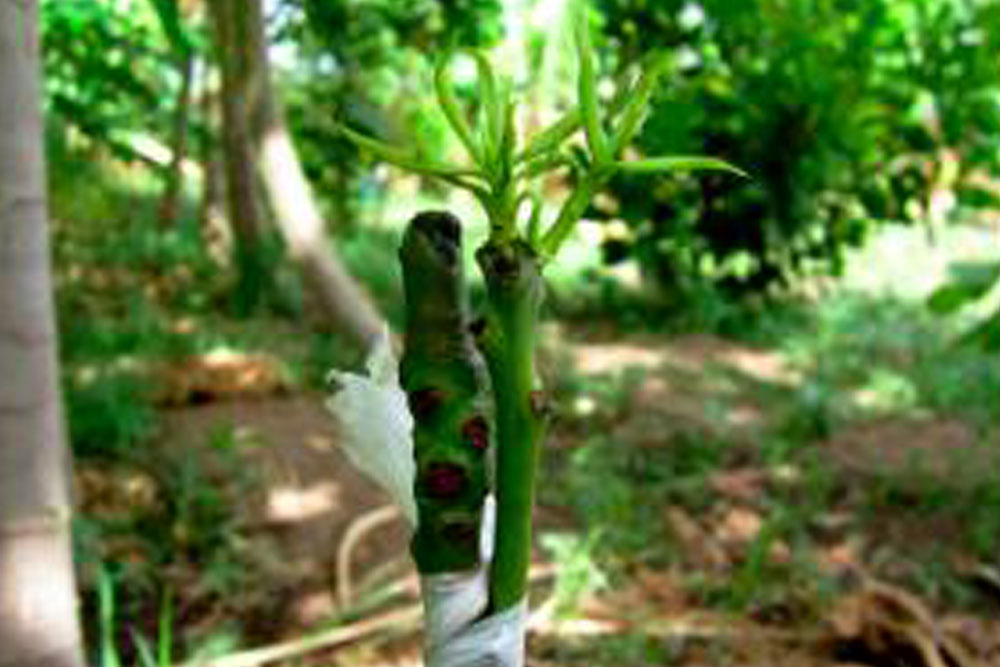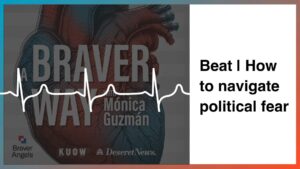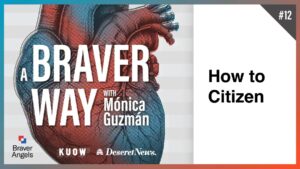Jan Rybeck
[Editor’s Note: This piece was written in the Fall of 2018 in the wake of the author, Jan Rybeck, participating in BA’s ‘Flying Angels’ program, wherein out-of-state moderators are flown to parts of the country that do not yet have BA workshop moderators. –LP]
I want so dearly to make traction that makes a difference. Sometimes I forget my way and overthink this. I think too much, trying to figure out my unique talents, trying to figure out what I bring to this difference-making thing. I think so much, in fact, that I think myself into exhaustion, and end up without enough energy left to actually do that difference-making stuff. And then I beat up on myself for not doing enough. This doesn’t happen often, but when it does, I really need a lift.
I was in one of these slumps when my Lyft driver showed up. I had been invited out from Washington, D.C. to moderate a Braver Angels Red-Blue workshop in Seattle. Mixed feelings were hitting me from all sides- excitement about what was possible, yet dubious about the real, probably miniscule impact that 6 hours of discussion can have against the goliath task of mending the polarization that marks our current political and cultural climate.
But despite the doubts, I have hope. I know firsthand the deeply touching insights and personal shifts that happen in the course of Braver Angels workshops. That’s what keeps me at it. The doubts still hurt, though. Echoes of comments such as “those workshops are like bringing pom-poms to a gun fight,” or “it’s all talk and no action,” cast a shadow that brings the magnitude of our national pain into high relief, diluting my enthusiasm with a strong dose of reality.
Thank heavens, then, for the everyday super-heroes. They show up in the most unlikely guises.
I was greeted by a buoyant, eager, smiling, boyish face. My Lyft driver, Molid, a seemingly invincible Somali-American, explained that he had been living in the US for the past ten years, oceans and continents away from his family of 6 and making his way in various odd jobs from Anchorage, Alaska to Alexandria, Virginia. He has managed to support himself, and send money back to his family, by driving cabs through the snowy winters in Alaska, and driving trucks back and forth across the vast expanse of the country. When Molid occasionally goes to Somalia, he works on his budding chicken farm, what he says is the second-largest in Somalia. There, he puts his young children to work tending the incubators and wells, always impressed with their homegrown ingenuity and thoughtful scrappiness. Throughout all this he emanated an electric gratitude for life and all its blessings.
His story reminded me of what is possible.
But one detail, in particular, struck me hard. Molid also grafts and grows trees on his Somali chicken farm. When he returns to Somalia, he walks his fields to find fallen branches and remnant, rare trees in need of revitalization. He presses together and cultivates these separated limbs into rejuvenated trees, former dying parts made whole again, converted to full participants in the life of the biosphere. It was clear this work was tremendously important to him.
When I asked about why it mattered to him so much, he explained that in his tradition as a Muslim, planting a tree is considered a holy deed. For with every soul, animal or human, who finds relief in the shade of a tree, the tree’s planter will have made a difference. Even after one’s time is done, their impact on others remains.
What struck me was that this was that Molid was not trying, actively, to make a difference; instead, a difference was being made, and Molid was part of it. It wasn’t just him, just his own conscious will, just his impact; he was joining with forces seen and unseen. Nature, circumstance, and the existing lack of shade, all were required for this difference to be possible. Molid was there, a happy instrument of the change. I doubt that the trees he planted are marked with plaques reading, “Molid Planted This Tree, 2018. You’re Welcome!” And yet, he seemed quite fulfilled knowing that his efforts were a powerful and significant part of the whole.
Everything that touches us bears the mark of others who made a difference, whether they know it or not.
What if every interaction is an opportunity, and it is just fine that we don’t know how much of the impact is due to us?
We don’t really get to know the who, or what, or when, or how, about our impression and impact on this world. Likewise, we can’t really discern the impact down the road of the inner and outer conversations and connections that occur through processes like the Braver Angels workshops. I am pretty certain that Molid had no idea how that 20-minute drive was an answer to my prayers for support, and that his words and spirit had an impact on me, at least, and my work. (Though the tip I gave him may have given him a hint.) That’s the mystery we wrestle and dance with- how much can we really determine the difference we make? Or what difference anyone makes?
But in the end, does it really matter how much of it had to do with us? What if we, I, you, just assume that, if with noble intent and good energy, differences are happening, and we should keep helping them on, whether we know if we helped with it or not?
That, to me, is the essence of what we are doing when we moderate the Braver Angels workshops. We are creating the structure and holding the space for conversations and connections to emerge and work their magic, in their own time and ways. It is not about us as individuals, or about the difference any one brilliant point can make, but about what emerges from the process, over time and with intention. It’s about habits and understanding and virtue, of healing the outer self by fixing the inner self, in the only way the inner self can be fixed- slowly, with a focus on the process, forsaking jealousy of the result.
Not at all unlike a shade tree, a sturdy and well-moderated process like the Braver Angels workshop can allow us to come together in the brilliant light of day without being overwhelmed by the heat.
And just as Molid cultivates new potential with every tree he grafts, imagine what we could do by carefully and attentively bringing together disparate elements of our political and cultural reality. What if being together, listening and opening up just a crack to one another, were just enough to get us started in making a difference?
And what if it were totally all right that we disappear into that effort, not caring who said what or who did what, but that together we are building something greater than what we individually hold?
Jan Rybeck is a Braver Angels member and workshop moderator from Northern Virginia. This essay was adapted from a previous version published in Medium and through Jan’s blog.





1 thought on “Braver Angels Super-Heroes”
Jan, thanks so much for this beautifully written piece. I loved your use of metaphor to get to the heart of what we do. While I’m in a period of my life where I’m getting constant energy from the work I do with BA, there are certainly times when we all experience disaffection and doubt. And it’s ideas like this that can help us see the big picture in those moments.
While I’m not religious, I do appreciate the basis of so many spiritual traditions in terms of our connectedness with one another and the rest of existence, and I feel that informs both my political philosophy and my work with Braver Angels, which is now really my life’s work. And with this piece I feel like you’ve spoken directly to that within me.